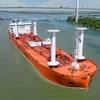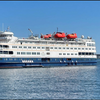Top Ten Hurricane Safety Tips for Boaters
ACE Recreational Marine Insurance releases ten tips to help recreational boaters protect their vessels during the hurricane season.
“The best defenses to protecting your boat from hurricanes or any severe weather are planning, preparation and timely action,” said Damon R. Hostetter, Senior Vice President, ACE Recreational Marine Insurance.
The first recommendation is:
Develop a detailed plan of action to secure your vessel in advance. Options for non-trailerable boats may include hauling your boat, securing your boat in the marina (if permitted) or moving your boat to a previously identified “storm refuge.” Specifically identify and assemble needed equipment and supplies. Keep them together and practice your plan to ensure it works before the hurricane season. Arrange for a qualified and capable friend or a licensed professional captain to carry out your plans if you are out of town during the hurricane season.
Owners of boats remaining in a marina berth can take the following precautions: Double all lines. Rig crossing spring lines fore and aft. Attach lines high on pilings to allow for tidal rise or surge. Make sure lines will not slip off pilings. Inspect pilings and choose those that appear the strongest and tallest, and are installed properly.
For boats remaining on a mooring, the mooring must be designed and maintained to withstand the load that will be placed upon it by the attached vessel. Owners should contact their marina to determine the maximum load their mooring will withstand and how that relates to a Category three storm. In addition, the chain and swivels that connect the mooring buoy to the anchor should be inspected and serviced annually. The mooring pennant to the buoy must be in good condition and should be doubled-up. Good chafing material should be secured in place where the pennant passes through chocks or other potential chafe points. The cleats or attachment points on the vessel should be substantial and have adequate backing plates, not simply washers.
Check your lease or storage rental agreement with the marina or storage facility. Know your responsibilities and liabilities as well as those of the marina.
For boats that can be trailered, the best course of action is to haul your vessel out of the water and move it to a safe location as far from tidal waters as possible, and away from trees that may topple. Also remember to pull the drain plug and remove electronics onboard.
To access the other 9 tips click here.














